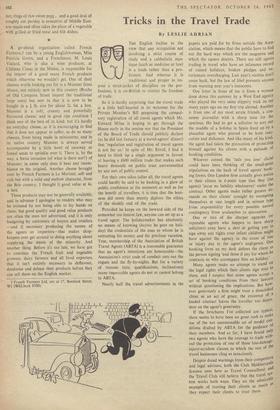Tricks in the Travel Trade
By LESLIE ADRIAN So it is hardly surprising that the travel trade is a little half-hearted in its welcome for the Private Member's Bill proposing the compul- sory registration of all travel agents which Mr. Edward Milne is hoping to get through the House early in the session nor that the President of the Board of Trade should publicly declare (as he did last January at a travel-agents' dinner) that 'regulation and registration of travel agents is not for us.' In spite of Mr. Erroll, I find it hard to think up a single argument in favour or leaving a £600 million trade that makes such heavy demands on public trust untrammelled by any sort of public control.
For their own sakes (after all, the travel agents could hardly be said to be basking in a glow of public confidence at the moment) as well as for the benefit of travellers, it is time that the busi- ness did more than merely deplore the ethics of the shoddy end of the trade.
Provided he keeps on the leeward side of the somewhat too lenient law, anyone can set up as a travel agent. The holidaymaker has absolutely no means of knowing (before he goes on holi- day) the credentials of the man to whom he is entrusting his money and his precious vacation. True, membership of the Association of British Travel Agents (ABTA) is a reasonable guarantee that an agent's intentions are honourable—the Association's strict code of conduct cuts out the rogues and the fly-by-nights. But for a variety of reasons (size, qualifications, inclinations) many impeccable agents do not or cannot belong to ABTA.
Nearly half the travel advertisements in the papers are paid for by firms outside the Asso- ciation, which means that the public have to find out the hard way which are the magsmen and which the square dealers. There are still agents trading in travel who have an infamous record of ruined holidays, broken pledges and ex- tortionate overcharging. Last year's victims don't come back, but the law of libel prevents anyone from warning next year's innocents.
One letter in front of me is from a woman done down this summer by a West End agency who played the very same slippery trick on me many years ago on my first trip abroad. Another is from one of my most astute friends, a con- sumer journalist with a sharp nose for the spurious. He had to get a solicitor to sort out the muddle of a holiday in Spain fixed up by a plausible agent who proved to be both inac- curate and dishonest. And like many of his kind, the agent had taken the precaution of protecting himself against his clients with a palisade of booking conditions. Whoever coined the 'tails you lose' cliche could have been thinking of the small-print stipulations on the back of travel agents' book- ing forms. One London firm actually gives notice to their clients in 6-point type that they (the agents) 'incur no liability whatsoever' under the contract. Other agents make rather greater de- mands on their clients' eyesight by exempting themselves at vast length and in minute tYpe from responsibility for every possible named contingency from avalanches to quarantine.
One or two of the sharper agencies (or reputable agents who happen to have sharp solicitors) even have a shot at getting you to sign away any rights your infant children might have against the agency in the event of loss or injury due to the agent's negligence. One booking form on my desk defines the client as the person signing 'and those if any for whom ,he contracts or who accompany him on holiday' Many agents make no attempt to stand on the legal rights which their clients sign over to them, and I suspect that some agents accept a set of booking conditions from their lawyers without questioning the implications. But how- ever generously a firm might treat a dissatisfied client as an act of grace, the existence of a loaded contract leaves the traveller too depen- dent on the agent's generosity. If the brochures I've collected are typical, there seems to have been no great rush to make use of the not unreasonable set of model con- ditions drafted by ABTA for the guidance of their members. And so far, I have found only two agents who have the courage to trade with out the protection of one of those loss-damage- injury-accident clauses to which the rest of the travel businesses cling so tenaciously. Despite dread warnings from their competitors and legal advisers, both the Club Mediterranee (known over here as Travel Counsellors) and the Travel Club still believe that the travel sys- tem works both ways. They set the admirable example of trusting their clients as much as they expect their clients to trust them.














































 Previous page
Previous page